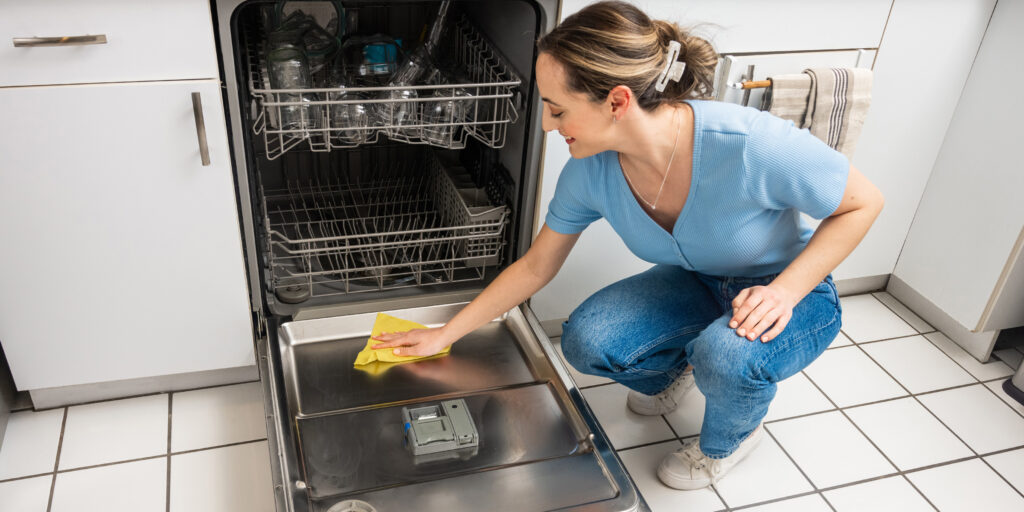
Are you tired of struggling to get your dishes clean after every meal? Look no further than your trusty dishwasher! This handy appliance has become a staple in many households, making dishwashing a breeze. However, like any machine, it requires proper maintenance to work efficiently and effectively. In this blog post, we’ll explore the different types of dishwashers available and provide expert tips on how to maintain your dishwasher for optimal performance. Say goodbye to dirty dishes forever with these helpful hints!
What Is A Dishwasher?

A dishwasher is a household appliance that washes dishes, cutlery, and other kitchen utensils. It operates by spraying hot water and soap onto the dirty dishes to remove any food particles or stains. The water is then drained away from the machine while clean water is introduced for rinsing.
Dishwashers come in various shapes and sizes, with different features depending on your needs. Some dishwashers have multiple racks for larger loads, while others have unique wash cycles tailored to specific types of dishes or cooking materials.
The invention of the dishwasher has made cleaning up after meals much easier and more convenient than ever before. Rather than spending time washing every dish by hand, you can simply load them into the machine and let it do all the work for you.
While some may argue that washing dishes manually is better for conserving energy and water usage, studies have shown that modern dishwashers are actually more efficient when used properly. By following proper maintenance techniques such as regular cleaning of filters and checking spray arms regularly, your dishwasher can save both time and resources in your home!
The Different Types Of Dishwashers

There are several types of dishwashers available in the market today. Each type has its own unique features and benefits, making it important to choose one that suits your needs.
The most common type is the freestanding dishwasher which can be installed anywhere in your kitchen as long as there’s a water and electrical connection nearby. Built-in dishwashers, on the other hand, are designed to fit seamlessly into your kitchen cabinets giving a sleeker look.
Slimline dishwashers are ideal for those with limited space who still want an appliance that can accommodate their dirty dishes. Countertop models are perfect for small households or apartments since they take up minimal counter space and require no installation.
Drawer dishwashers offer more flexibility than traditional options, allowing you to run smaller loads whenever needed without wasting energy or water. Portable dishwashers provide convenience by allowing you to move them around easily when cleaning or storing them away after use.
Ultimately, choosing the right type of dishwasher depends on your individual preferences and needs.
How To Maintain Your Dishwasher

Maintaining your dishwasher is essential to keep it running smoothly and efficiently. Here are some tips on how to maintain your dishwasher:
Firstly, always make sure you clean the interior of the dishwasher regularly. Remove any food debris or small particles that may have accumulated at the bottom of the machine.
Secondly, inspect and clean the spray arm holes for blockages in order to ensure they are not clogged with food residue or hard water deposits which can negatively impact its performance.
Thirdly, use a soft brush or cloth to gently scrub around the door seals of your dishwasher as this area can easily collect dirt over time.
Fourthly, check if there is any damage to racks and tines; replace them immediately if necessary because rusty metal can result in scratches on dishes and glasses.
Once a month run hot water through your empty dishwasher using white vinegar instead of detergent which will help eliminate unpleasant odors while also cleaning away any mineral buildup from hard water areas like faucets.
Tips For Cleaning Your Dishwasher

Cleaning your dishwasher regularly is an essential part of keeping it in good working condition. Here are some tips to help you keep your dishwasher clean and functioning properly:
First, remove any large food particles or debris from the bottom of the dishwasher before running a cycle. This will prevent clogs in the drain and ensure that water can flow freely.
Next, wipe down the interior of the dishwasher with a damp cloth or sponge to remove any remaining food residue or stains. Be sure to pay special attention to areas around the spray arms and door seals, as these can be hotspots for buildup.
For tougher stains or odors, consider using a specially formulated dishwasher cleaner. These cleaners are designed to break down grease and grime while deodorizing your machine.
Another important step in maintaining your dishwasher is cleaning out its filter regularly. Most dishwashers have filters that need to be cleaned every few months depending on usage.
Run an empty cycle with vinegar once a month to help freshen up your machine and dissolve any mineral deposits that may have accumulated over time.
By following these simple cleaning tips, you’ll be able to keep your dishwasher running smoothly for years to come!
Conclusion
Maintaining your dishwasher can help extend its lifespan, improve its efficiency, and ensure that it cleans your dishes effectively. Regular cleaning and maintenance of your dishwasher is crucial to keeping it running smoothly.
In this article, we have covered the basics of what a dishwasher is, the different types available in the market, and some tips on how to maintain them. We’ve also shared some helpful ideas for cleaning your dishwasher.
Remember that proper maintenance begins with reading the manufacturer’s manual carefully so you can follow all instructions on maintaining your specific model. Always make sure to clean both inside and outside components regularly using appropriate methods such as vinegar or baking soda solutions along with warm water while avoiding harsh chemicals like bleach which could damage parts over time.
Using these simple steps and being consistent will ultimately save you money by ensuring that you won’t need repairs anytime soon. Lastly always remember – Prevention is better than cure!

